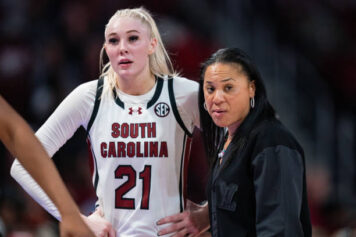One of the biggest misconceptions about student athletes on the collegiate level is that they are being given something of worth (a free education) in exchange for their compliance in the classroom and their hard work on the playing field as well. But it's a bit murkier than that. The NCAA loves to paint itself as this grand organization created for the good of all student athletes; however, every so often there comes a story that reveals the gnashing teeth of the beast that is the NCAA, college athletic programs and the seemingly arbitrary nature they seem to make decisions as they pertain to student athletes.
By all accounts, Simmons was a model student athlete at the University of Alabama. She averaged nearly 14 points per game during her time as a member of the underachieving Crimson Tide women’s basketball team and graduated with a degree. Unfortunately, her family is suffering financially because of the failing health of both her older brother and her mother. So what would the caring, kind hearted institution do? Whatever that is, Alabama did exactly the opposite.
When Simmons, who originally had one year of eligibility left, decided that it would be best for her and her family if she transferred to Seton Hall to be close to home there’s no doubt in our minds that she thought it would be a done deal. After all, she was a great student and a very good athlete who never got in trouble or caused waves and she even applied to U of A’s MBA program but was rejected. Everything pointed to a New Jersey homecoming in her near future. Initially, the university granted Simmons permission to transfer. So imagine her surprise when Alabama blocked her request for a waiver to play next season. The apparent reason is that Simmons’ request to transfer, which came last May, came too late in the recruiting cycle for U of A to replace her with a scholarship-worthy player.
Daisha reportedly wants to play this year so that she can graduate as soon as possible to obtain a good paying job to assist her mother with the bills, who herself is already working two jobs to care for her son. The NCAA has said that it would be okay for her to sit out the upcoming season and maintain her eligibility for the 2015-2016 season. It’s rumored that the university is saying they did not know the depth of the situation the Simmons family was facing. But young Daisha, to her credit, was an ardent record keeper. She kept email correspondence in which she advised the UA athletic department of her situation months in advance.
"I've been hearing that Associate Athletic Director Shane Lyons and individuals at UA have been telling reporters and others in private that I did not inform them specifically on my family issues," Simmons said in a statement to Swish Appeal. "This is 100% false and it is unfortunate to be in a predicament where I have to prove that I did in fact tell the committee board at UA what my family issues were during the time I was asking for my release.
"An email was sent to me from committee lady Helen Allen informing me that the UA committee, whom I had to sit in front of and explain to them why I wanted to go home, supported the coaching staff decision to deny my release. They wrote, 'Based on the response received from the committee, we support the decision to not issue an athletic release. This decision was based on the documentation provided by both you and the athletic staff.'
"I am unaware of the document provided by the athletic staff however, this document is what I provided to the committee and it proves the UA administration was informed of my family issues. Although I am not particularly happy with having to prove I am telling the truth, my family and I will not stand for people telling lies about me. It is unfortunate that this situation has escalated to this point, all I wanted to do was to be able to move on with my life."
For those that are unaware of how a scholarship works, kids who are offered scholarships to colleges and universities with a Division I, Division II, NAIA or other designation are required to sign a letter of intent to the school they wish to attend before going to that school. Many highly-touted student athletes sign these letters on national signing day, which varies depending on the sport. But this letter is actually a contract that makes these students akin to being the property of whatever school they are attending. A National Letter of Intent guarantees financial aid to the student athlete and forbids coaches from other institutions from recruiting the student athletes any further. However, as was mentioned by many prominent sports journalists, the student athlete is actually at a disadvantage on many fronts. For example, institutions have the right to refuse admission to the student for any non-academic reason it can dream up even after a National Letter of Intent has been signed.
In these instances, the student athlete has no course of action to appeal this decision. Also, many schools only offer scholarships on a year to year basis. This gives the school flexibility to remove underperforming players from their programs, thus ending enrollment at the institution in question. This, despite the National Letter of Intent stating that the student was recruited to attend the institution rather than a particular athletic program.
This illustrates how student athletes are actually at the mercy of a university’s discretion. The National Letter of Intent is a one-way commitment to the university in question, but requires no obligation from the university.
In 2001, Dan Wetzel of Yahoo! Sports, then writing for CBS Sportsline, had this to say “What is thought to be guaranteed really isn’t. What people believe it represents, it doesn’t. What is meant to be a celebration, should really be a final chance for someone to closely read it.”
Simmons originally signed her National Letter of Intent with Rutgers University in 2009 after playing her high school basketball at Gill St. Bernard’s. She would transfer to the University of Alabama in 2010 and sit out a year. The provisions of her initial letter of intent transfered with her. As stated earlier, Daisha would become one of the Crimson Tide’s leading scorers and completed her coursework on the way to earning a degree. She did everything that was expected of her, so why was Simmons denied her transfer request to Seton Hall when other SEC schools field transfers on a regular basis? Players who wished to transfer for reasons less serious than those the Simmons family is dealing with were granted permission to play almost immediately after their transfer.
On the eve of Don Jackson, Simmons’ legal representation, filing a Title IX lawsuit, Alabama has relented. On October 7, Alabama Director of Athletics Bill Battle released the following statement:
"This afternoon, The University of Alabama contacted the NCAA to inform them that the University supports Daisha Simmons' request for a waiver from the NCAA allowing her to be eligible to play basketball at Seton Hall in 2014-15. This gives the NCAA the opportunity to revisit the situation, if they so desire, and to consider information that could be provided by Miss Simmons, including documentation that could substantiate significant medical issues in her family, that could affect her ability to be granted a waiver to be eligible for competition immediately.”
Even in granting Daisha Simmons the waiver she so desired, the University of Alabama’s letter wreaks of doubt and disbelief toward their former player’s claims of medical hardship visiting her family. Medical hardships aside, shouldn’t a player who has already graduated be automatically granted such a waiver? Should Simmons, who had already graduated last December, have taken 13 credits that she didn’t need just to play at U of A? Daisha Simmons had said that Alabama’s initial refusal to grant her a waiver to play next season was spiteful, and we would have to agree with that measure.
The University’s 12th hour capitulation on the matter makes all this wrangling even more troublesome and unnecessary in retrospect. However, the entire sordid affair should act as cautionary tale for all student athletes. Though a free education and a chance to play at some of the most highly publicized programs in the nation is an incredible opportunity, the sad truth is that the athletes are at the mercy of the institution, and ultimately, the NCAA. Their willingness to do what’s right for the student athlete is arbitrary and fluctuates.
At the end of the day, the student athlete’s desires are not as important to the school as maintaining a competitive program. That fact is illustrated time and time again. Before you sign on the dotted line, know exactly what you’re getting yourself into, for at the end of the day, they're not obligated to give you a damn thing.



